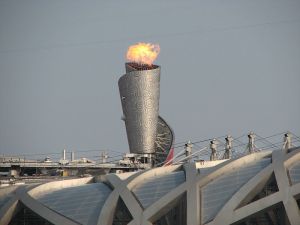“Legacy”. This word has been thrown about constantly in the lead up to the London Olympics. At times it feels like any kind of meaningful legacy will be lost and squandered due to the down turn of the economy and recession, at other times a more optimistic view prevails. There are, of course, the obvious improvements to east London, where the stadium, parks and transport connections have vastly improved. Then there is the focus on youth where attempts have been made to inspire and encourage sport and exercise. Then there are the background financial benefits of hosting the games. Numerous contracts have brought money to Britain in preparation and for the Games themselves. Whether these benefits outweigh the negatives only time will tell.
Amongst these varying legacies is one that is never really talked about – the legacy of archiving. The mass of text, images, video, audio, and objects that have been created in preparing for and promoting the Olympics is staggering. Archivists at the National Archives in Kew alongside the now-defunct Museums, Libraries and Archives council (MLA) have been developing frameworks, making or extending connections with businesses, government, charities and other bodies with some form of involvement in the event not only from when the bid became successful, but from the very moment (or as near to as possible) that the idea of bidding for the 2012 Olympics was written down. Thus archivists have been dealing with the Olympic archival legacy for at least a decade.
With the launch of the National Archives Olympics website and the approach of the Olympic Games themselves it seemed appropriate to discuss Cathy Williams (National Archives) podcasted paper; itself archived on the IHR’s History SPOT platform. The documentation strategy employed to capture the London Olympics for future generations is simply called The Record and attempts to capture as much multimedia information and experiences related to the Olympic Games as possible from the inception of the idea to bid for the games, right through the bidding process and lead up, and finally the Games themselves. The data collected, as with all archival collections, had to be decided upon and gathered in relation to various organisations and groups. At the heart of any collection are a series of decisions and concessions concerning content, data management, and access. A good or bad decision early on in the process can make all the difference as to the success or failure of a collection.
In the case of the Olympics the National Archive and MLA were faced with a difficult problem: how do you capture the delivery, managing, and enjoyment of a finite event? Where is your starting point and where do you stop? Cathy Williams explains that in this instance the Minnesota method was employed as a framework for drawing in material to the archive: they were interested not just in what they might normally expect an archive to contain, but on what they might normally have missed. The Minnesota method is basically an archival strategy for appraising materials that combine aspects of collection analysis, documentation strategy, appraisal, and functional analysis. The method attempts to enable archivists to find not only the obvious materials but those that might be less obvious. Cathy Williams notes that there are relatively few examples where the Minnesota method has been employed in its entirety but the challenge of the London Olympics will become one of them.
The National Archives website notes that management of these records will:
- support openness and transparency for all
- support effective delivery of the Olympic sports and cultural events across the UK
- reduce reputational, financial and operational risks
- guarantee legal and regulatory compliance
- answer to public accountability and scrutiny post-2012
- secure a long-term legacy for the benefit of current and future planners, policy makers, researchers, learning and education professionals and the general public
The result is the National Archives Olympics website The Olympic Record. This site is usefully split into two: one option takes you to a beautifully displayed timeline containing archival materials from the first modern games of 1896 (held in Athens) right up to the London 2012 games. The other option ‘2012 Activities’ brings you straight to the archival collection undertaken by the National Archives and MLA which is already looking like an amazing resource.
I think what is most exciting about this venture is that even when these Olympics are done and dusted, the legacy of the archives continues not only as a collection in its own right but as a way forward for future Olympiad events. Cathy Williams explained that the process they undertook in developing a strategy for archiving the Games will be handed over to the next host nation and then the next. The archives for the London Games will therefore be placed within its wider context of the Games history forming part of a much larger and fascinating collection about sportsmanship, competition, and even organisation on a global scale. The Olympic Record website supports this aim splendidly and is well worth a good delve.


Thank you for this. One of the best legacies in my view was LA84 – digitised Olympic/sports journals etc – open to all and free to use on the internet. It proved invaluable in researching my own account of the Wenlock Olympian Games as the forerunner to the modern Olympics.